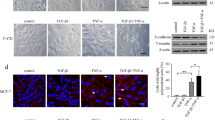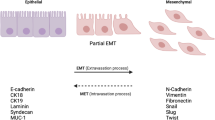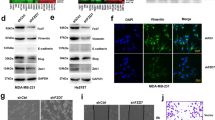Abstract
Breast cancer is the leading cause of cancer death in women worldwide, which is closely related to metastasis. Recent studies argue that breast cancer cells that have undergone epithelial-to-mesenchymal transition (EMT) acquire aggressive malignant properties, but the molecular mechanisms underlying this transition are poorly understood. In this study, we found that siRNA-mediated attenuation of B-Myb expression restored E-cadherin expression and cell–cell junction formation in breast cancer cells, suppressing cell invasion, anchorage-independent growth, and tumor formation. In contrast, the forced B-Myb expression decreased the expression of the epithelial marker E-cadherin, but increased the mesenchymal markers in breast cancer cells. We found that B-Myb upregulated expression of the key EMT regulator snail and that it mediated EMT activation and cell invasion by B-Myb.




Similar content being viewed by others
References
Acloque H, Adams MS, Fishwick K, et al. Epithelial–mesenchymal transitions: the importance of changing cell state in development and disease. J Clin Invest. 2009;119:1438–49.
Bao B, Wang Z, Ali S, et al. Over-expression of FoxM1 leads to epithelial–mesenchymal transition and cancer stem cell phenotype in pancreatic cancer cells. J Cell Biochem. 2011;112:2296–306.
Barbera MJ, Puig I, Dominguez D, et al. Regulation of Snail transcription during epithelial to mesenchymal transition of tumor cells. Oncogene. 2004;23:7345–54.
Cano A, Perez-Moreno MA, Rodrigo I, et al. The transcription factor snail controls epithelial–mesenchymal transitions by repressing E-cadherin expression. Nat Cell Biol. 2000;2:76–83.
Chen J, Ou-Yang X, Gao J, et al. Knockdown of ribonuclease inhibitor expression with siRNA in non-invasive bladder cancer cell line BIU-87 promotes growth and metastasis potentials. Mol Cell Biochem. 2011;349:83–95.
Li H, Chen X, Gao Y, et al. XBP1 induces snail expression to promote epithelial- to-mesenchymal transition and invasion of breast cancer cells. Cell Signal. 2014a.
Li H, Song F, Chen X, et al. Bmi-1 regulates epithelial-to-mesenchymal transition to promote migration and invasion of breast cancer cells. Int J Clin Exp Pathol. 2014;7:3057–64.
Liao XH, Wang N, Liu LY, et al. MRTF-A and STAT3 synergistically promote breast cancer cell migration. Cell Signal. 2014;26:2370–80.
Lo HW, Hsu SC, Xia W, et al. Epidermal growth factor receptor cooperates with signal transducer and activator of transcription 3 to induce epithelial–mesenchymal transition in cancer cells via up-regulation of TWIST gene expression. Cancer Res. 2007;67:9066–76.
Montagner M, Enzo E, Forcato M, et al. SHARP1 suppresses breast cancer metastasis by promoting degradation of hypoxia-inducible factors. Nature. 2012;487:380–4.
Nieto MA. Epithelial–mesenchymal transitions in development and disease: old views and new perspectives. Int J Dev Biol. 2009;53:1541–7.
Pan X, Xiong D, Yao X, et al. Up-regulating ribonuclease inhibitor inhibited epithelial-to-mesenchymal transition and metastasis in murine melanoma cells. Int J Biochem Cell Biol. 2012;44:998–1008.
Qiao Y, Jiang X, Lee ST, et al. FOXQ1 regulates epithelial–mesenchymal transition in human cancers. Cancer Res. 2011;71:3076–86.
Rosano L, Spinella F, Di Castro V, et al. Endothelin-1 promotes epithelial-to-mesenchymal transition in human ovarian cancer cells. Cancer Res. 2005;65:11649–57.
Schmalhofer O, Brabletz S, Brabletz T. E-cadherin, beta-catenin, and ZEB1 in malignant progression of cancer. Cancer Metastasis Rev. 2009;28:151–66.
Thiery JP, Acloque H, Huang RY, et al. Epithelial–mesenchymal transitions in development and disease. Cell. 2009;139:871–90.
Yoshida J, Horiuchi A, Kikuchi N, et al. Changes in the expression of E-cadherin repressors, Snail, Slug, SIP1, and Twist, in the development and progression of ovarian carcinoma: the important role of Snail in ovarian tumorigenesis and progression. Med Mol Morphol. 2009;42:82–91.
Yuan H, Kajiyama H, Ito S, et al. ALX1 induces snail expression to promote epithelial-to-mesenchymal transition and invasion of ovarian cancer cells. Cancer Res. 2013;73:1581–90.
Zhu J, Pan X, Zhang Z, et al. Downregulation of integrin-linked kinase inhibits epithelial-to-mesenchymal transition and metastasis in bladder cancer cells. Cell Signal. 2012;24:1323–32.
Conflict of interest
No potential conflicts of interest were disclosed.
Author information
Authors and Affiliations
Corresponding author
Rights and permissions
About this article
Cite this article
Tao, D., Pan, Y., Jiang, G. et al. B-Myb regulates snail expression to promote epithelial-to-mesenchymal transition and invasion of breast cancer cell. Med Oncol 32, 412 (2015). https://doi.org/10.1007/s12032-014-0412-y
Received:
Accepted:
Published:
DOI: https://doi.org/10.1007/s12032-014-0412-y




